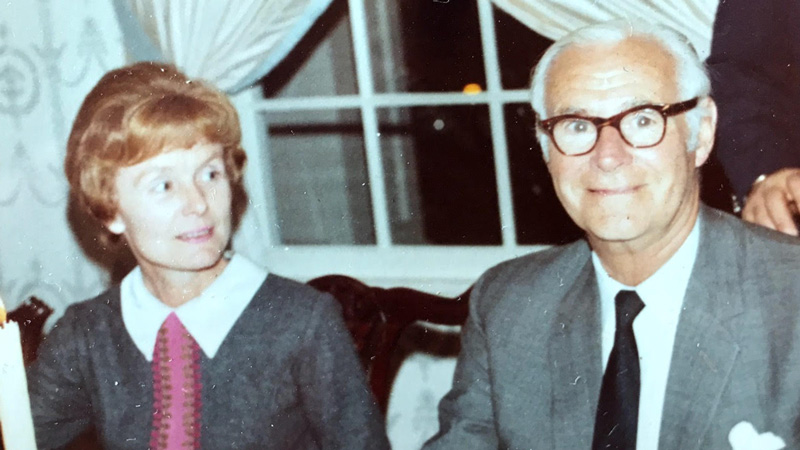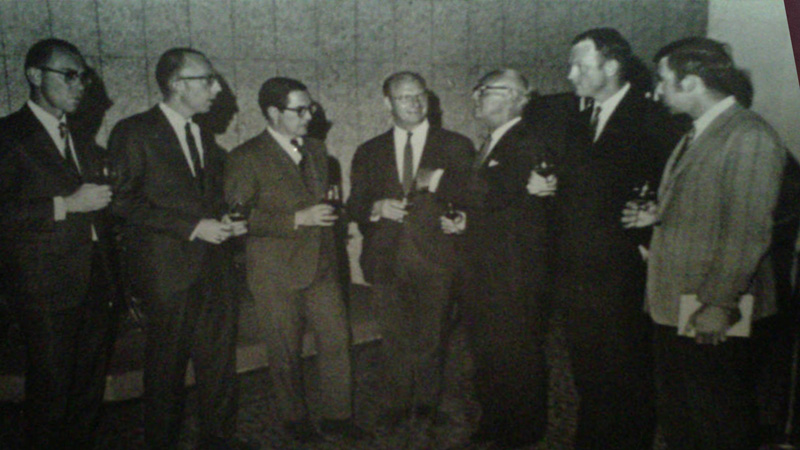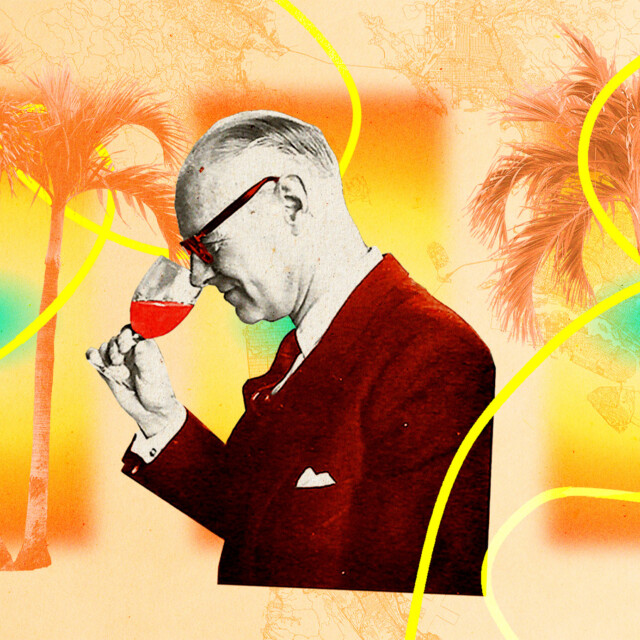A new-concept redo of the famed 1976 Judgment of Paris — organized by sommelier-turned-winemaker Patrick Cappiello of California’s Monte Rio Cellars — is set to drop in the first half of 2025. And in the buildup, all the typically associated (and much deserving) historical names from the original event are back in the conversation: organizers Steven Spurrier and Patricia Gastaud-Gallagher, Chateau Montelena’s Mike Grgich and the Barrett family, Warren Winiarski of Stag’s Leap Wine Cellars, etc.
But there’s a forgotten name hidden in the shadows, collecting cultural cobwebs despite its critical importance and prior fame. It’s a name now consistently omitted from the list of those who deserve credit for the overall grand arrival of California wine on the international stage.
That name is Harry Waugh, born 1904 just north of London, and lovingly known among his American contemporaries as “the man with the million dollar palate.”
“His period of influence was a long time ago, probably before most of the people [now] in the California trade were born,” says Jancis Robinson, the Financial Times wine writer, critic, author, and editor in chief at JancisRobinson.com. And while the esteemed Englishman wasn’t directly involved in the Judgment, without his advocacy and influence in the years leading up to the shocking Californian triumph over France, it’s questionable whether any aspects of the era’s great California wine awakening — and all the effects, good and bad, that followed — would have unfolded the way they did.
Whether by merchants, writers, storied restaurateurs, or illustrious winemakers, Waugh’s impact was felt in every corner of that epoch’s wine ecosystem.
California Wine’s Original English Ally
In the 1960s and early ’70s, prior to the notorious tasting, California was still largely considered a wine-world backwater outside the U.S. While the state was already a domestic powerhouse of production going back a century, the repressive calamity of Prohibition and its lingering aftershocks had continued to stymie California wine’s wider acceptance.
Californians could crow all they wanted about the quality of what they were producing, but that evangelism would overwhelmingly fall on deaf ears over in Europe. As so often is the case, it required the advocacy of one of their own for Europeans to finally realize the magic of what the Golden State was producing.
By the time the early 1960s rolled around, Harry Waugh served as both a director at Bordeaux’s grand Château Latour and a veteran buyer and director at famed U.K. importing merchant Harveys of Bristol, where he was instrumental in shaping no less a legend than the late wine writer and auctioneer Michael Broadbent. “He was very much Michael Broadbent’s mentor,” Robinson says. “I wouldn’t say Harry was a great stylist as far as writing goes. His talent was more in tasting and identifying quality in wines.”
According to many who knew him and his work, Waugh’s economy and understatement in both his writing and evaluation allowed him to cut through the pomp and into the accessible soul of wine. He was quite literally the opposite of today’s flamboyant, ad nauseam grocery list of flavor references.
“Harry would make the introductions for Bern, especially in Europe, of all these wine people. [And] Harry would tell Bern, ‘Hey, you should buy this cellar or buy that cellar [at the Christie’s auctions].’ The Bern’s cellar wouldn’t be nearly as impressive as it is without Harry.”
“My father described Harry Waugh as one of the greatest wine tasters of all time,” says Bartholomew Broadbent, son of Michael, and owner and CEO of touchstone importer Broadbent Selections. “Harry just understood wine and told you if it was good or not with very minimal descriptors. Simplicity was his essence. He was a modest man with a modest use of words to convey a message. He wrote and described wine in a way which made sense.”
His wine travels, and subsequent writings about said journeys, began pushing California wine toward cultural recognition among the English. “Michael got him recording his U.S. travels in a series of diaries published by Michael when he was at Christie’s,” Robinson says. Yet even before that, his books — beginning with 1966’s “Bacchus on the Wing” — were opening the minds of those in the European wine trade to the spectacular potential of California wine.

By 1976’s Judgment, supposedly the spark that ignited everything in accepted California wine lore, Waugh had already published volumes on the topic and was busy founding the Zinfandel Club in London — along with fellow Englishmen John Avery and Hugh Johnson — as an evangelical outpost to extol the merits of California’s largely unheralded wines in the U.K.
The Bern’s Steak House Connection
A mecca for wine professionals and enthusiasts globally, Bern’s Steak House in Tampa, Fla., boasts the world’s largest single-owner private wine collection on Earth. It’s a triumph, a dizzyingly diverse, passionate aggregation of more than a half-million bottles lovingly foraged over decades.
Yet Bern and Gert Laxer’s singular vision of wine cellar greatness couldn’t have been built without one Harry Waugh. It’s a relationship so symbiotic that the famed dessert lounge at Bern’s, complete with private booths fashioned from old wine casks, is deferentially titled the Harry Waugh Dessert Room.
“If you asked anyone of importance in Napa Valley about who was doing the most to promote Napa Valley wines, the answer would almost certainly have been Barney Rhodes [of Bella Oaks Vineyard] as an American and Harry Waugh as a Brit.”
Waugh was a connector as much as he was an advocate, and opened cellar doors for Bern across the world. “It’s pretty crazy, the Bern’s tie-in to the wine world that no one knew about,” says Eric Renaud, the longtime former wine director at Bern’s Steak House. “Harry would make the introductions for Bern, especially in Europe, of all these wine people. [And] Harry would tell Bern, ‘Hey, you should buy this cellar or buy that cellar [at the Christie’s auctions].’ The Bern’s cellar wouldn’t be nearly as impressive as it is without Harry.”
True to form, the Englishman pointed Bern in the direction of the great wines of California. “We have ’60s- and 70s-era California wines in multitudes, probably more than any other. And especially of Zinfandel,” Renaud says. “Some of the guys talk about Bordeaux and Burgundy of the early 20th century … but I’ve put those Zins up against Burgundy, and a couple guys thought it was Burgundy.”
As if to complete the cosmic wine circle under Waugh’s mentorship, it turns out that the official photographer at the Judgment of Paris was none other than that titan of Tampa himself, Bern Laxer.
“Without those giants who no one knows about, like Harry, California wine and Bern’s wouldn’t be what they are today,” Renaud says. “Spurrier and those who followed owe a lot to him.”
A Bygone Era of Transatlantic Wine Appreciation
Though he now appears as a mere footnote in California wine history, Waugh was a monumental figure in his time.
“If you asked anyone of importance in Napa Valley about who was doing the most to promote Napa Valley wines, the answer would almost certainly have been Barney Rhodes [of Bella Oaks Vineyard] as an American and Harry Waugh as a Brit,” Broadbent says. “The great restaurateurs of San Francisco, like Jeremiah Tower and Alice Waters, would all remember [him].”
But just as important as Waugh’s influence was as California cheerleader-in-chief, it’s critical to recognize that his advocacy was a complementary two-way conduit between the continents at the time.
“It gave him the opportunity to show California wines to Europeans, and bring more knowledge of French wines to the Americans,” Renaud says. But while European appreciation of California wine has experienced a backslide since the days of Waugh — for various reasons including its modernist style, exorbitant pricing, and the domestic oversupply tormenting Europe — his dissemination of European wine culture in the States remains undoubtedly influential to an entire generation of California winemakers.

Among those is California’s beloved “Godfather of Zinfandel,” Joel Peterson. As the founder and winemaker emeritus at Ravenswood Winery, as well as current vintner and sole proprietor of Once & Future Wine, Peterson absorbed Waugh’s influence via his parents, Frances and Walter Peterson. “My mother was very involved in cooking, and recipe-tested for the first Chez Panisse cookbook. My father started one of the first wine newsletters in the San Francisco Bay area. They were part of the Bay Area wine scene that revolved around Berkeley wine and food society,” Peterson says. “[Waugh] was a favorite with my parents. My mother was smitten with him,”
“It was the Brits that were dabbling in California wine,” he adds. The swath of Europe’s major wine-producing nations were, and continue to be, self-absorbed. “I doubt whether the French had any interest in California wine,” Peterson says. “In fact, California was still modeling them, which is probably why they were so arrogant about, and surprised by, the results.” Clearly, getting bested at their own game isn’t something the French cope with easily.
But Peterson agrees that the course of California wine’s global awakening was indelibly influenced by Waugh’s contagious zeal for the magic that was happening on the West Coast at that time — and adds that California advocacy in Europe currently lacks a figure of Waugh’s pedigree and passion. “I have been selling wine for several decades in Europe and the U.K. There are perilously few that have taken up the mantle of wine’s California champion,” Peterson says. “There’s no one quite like him today.”
As for why Waugh has been relegated to a quiet aside in the grand recounting of California’s wine history, Renaud ironically points straight to one of Waugh’s finest attributes: his brilliant prescience. “He was ahead of his time. I don’t think the U.S. was ready for him,” Renaud says. Whether remembered and appreciated or not, California owes Waugh an immense debt of gratitude for the vinous trail he blazed toward its eventual global eminence.
